It's Time to Admit That Ethan Hawke Is the Greatest Actor of His Generation
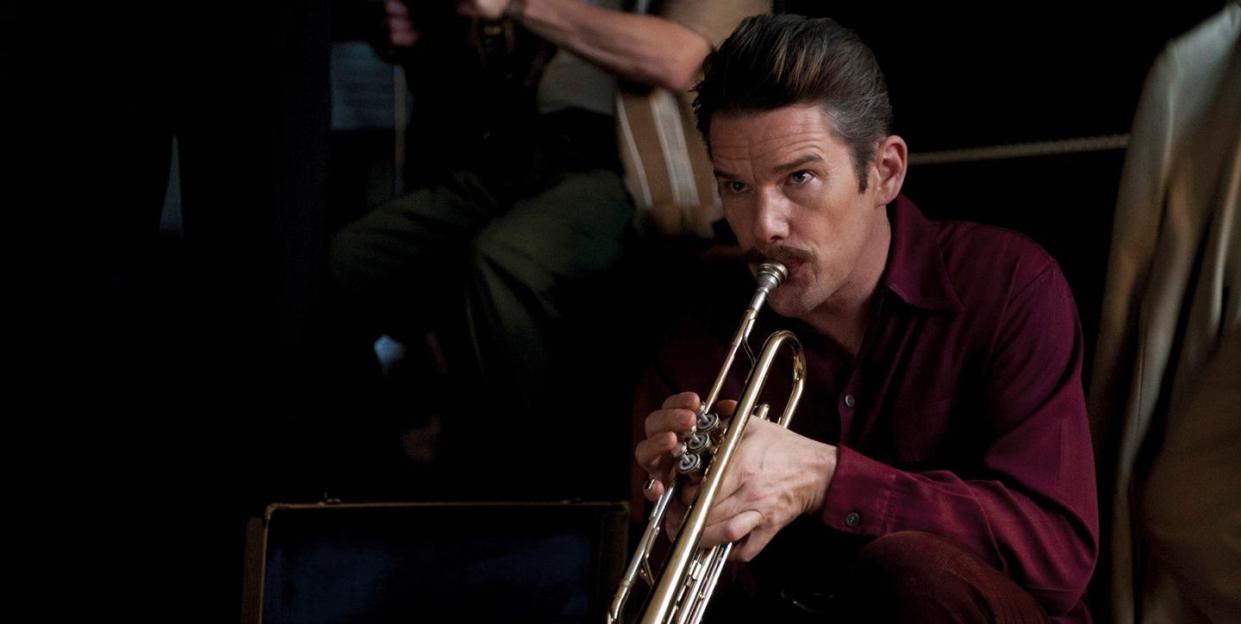
"Hearst Magazines and Yahoo may earn commission or revenue on some items through the links below."
There was a time when it appeared as if Ethan Hawke’s career arc was going to be one that went from playing the fresh-faced youth who must learn about the world’s duplicities and disappointments (Dead Poets Society) to playing the kind of ineffectual slacker whose main purpose onscreen seemed to be to demonstrate what happens when the neck of a Gap t-shirt loses its elasticity (Reality Bites). It was unthinkable to imagine that Hawke would be where he is now, and that is the best American screen actor of his generation.
That claim may surprise or amuse you. What, big films, you might ask, has Hawke starred in, what performances have dominated the public conversation, at least for the duration of an awards season? The answer—that most of his roles have been in small films that didn’t make an impact at the box office—is, I would argue, precisely what has allowed him to amass such a deep and varied body of work.
It has long been a cliché that actors or directors or writers who want to do good work in film have to avoid Hollywood. For years that was the mantra of snobs who refused to recognize the truth of Jean Renoir’s remark that there was no reality in American movies but something better—great truth. At this moment, I would argue that there is almost no way for an actor to build a significant career by sticking to Hollywood. The occupation of mainstream commercial cinema that constitutes the Marvel Universe, and the general immersion in fantasy, has meant that an entire generation of actors are losing the chance to play the adult roles that previous generations of film actors got to play. Forget the prestige roles, the adaptations of plays or popular novels. I’m talking about the noirs and Westerns and social dramas and sophisticated romantic comedies (by which I do not mean the bastion of cute known as the rom-com) that at one time made up the majority of movies made for grownups and allowed the actors in them to assay adult emotions. Robert Downey Jr. has not had a lead or featured role in anything other than a Marvel movie in nine years. The Johnny Depp of Donnie Brasco and Dead Man and Fear and Loathing in Las Vegas seems almost another actor from the one who has submitted himself to one damn Halloween costume after the other. Brie Larson has gone from an Oscar for Room to an endless series of Marvel pictures.
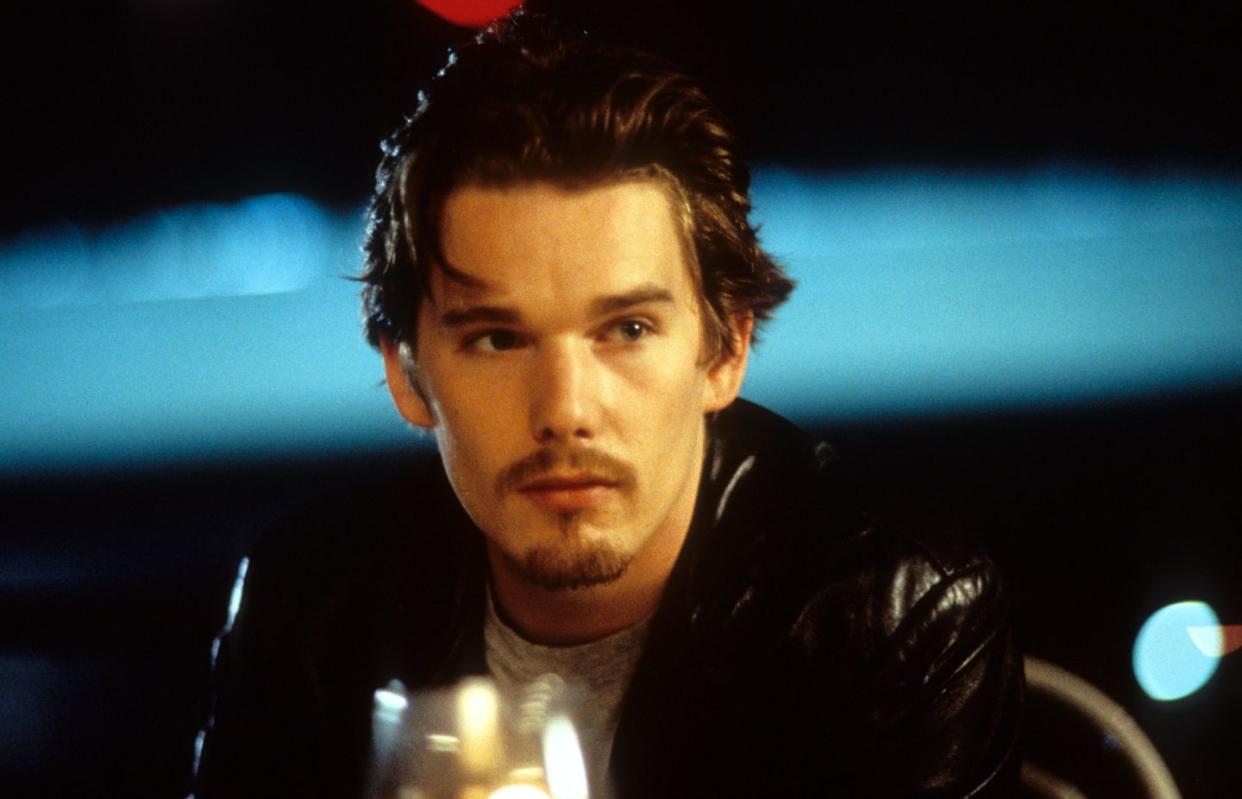
I don’t wish to make it sound as if the claims I’m making for Ethan Hawke are due him by default, because of the movies he doesn’t make instead of the ones he does. (Plus, he did dabble in the MCU in 2022 when he appeared in the Moon Knight TV series.) The depth and variety of Hawke’s performances over the last three decades would stand out if American movies were in healthy shape. Given their present infantile condition, his body of work seems like an almost inadvertent act of refusal. The one time Hawke got some of the attention and praise and awards he deserved came from playing a tormented alcoholic priest in Paul Schrader’s First Reformed. But there have been scores more that went criminally under-appreciated.
The first sign that there was something more to Ethan Hawke came in Richard Linklater’s 1995 Before Sunrise, the first of—to date—three pairings with Julie Delpy, the two of them playing Jesse and Celine, an American boy and a French girl who meet on a train going through Europe and get off to spend the night walking around Vienna, both in love by the time morning comes and both too afraid to admit it, neither realizing that the events which will upend and define their lives, bring it the most acute pain and most glorious joy, have been set in motion.
Those of us watching the movie when it came out didn’t realize it either. We hoped there was more for these two accidental lovers, even as the romantics among us believed this was no accident. I remember the first time I saw the movie thinking that if I were part of a generation that could produce something like this, could in part be defined by it, I would be very proud. Seeing it again recently, it became clear that the movie belongs in a league with L’Atalante and The Umbrellas of Cherbourg (which Linklater quotes towards the end of his film), movies about the sort of young love that makes the world around it look beautiful simply because it can contain emotion so fervent and wonderstruck.
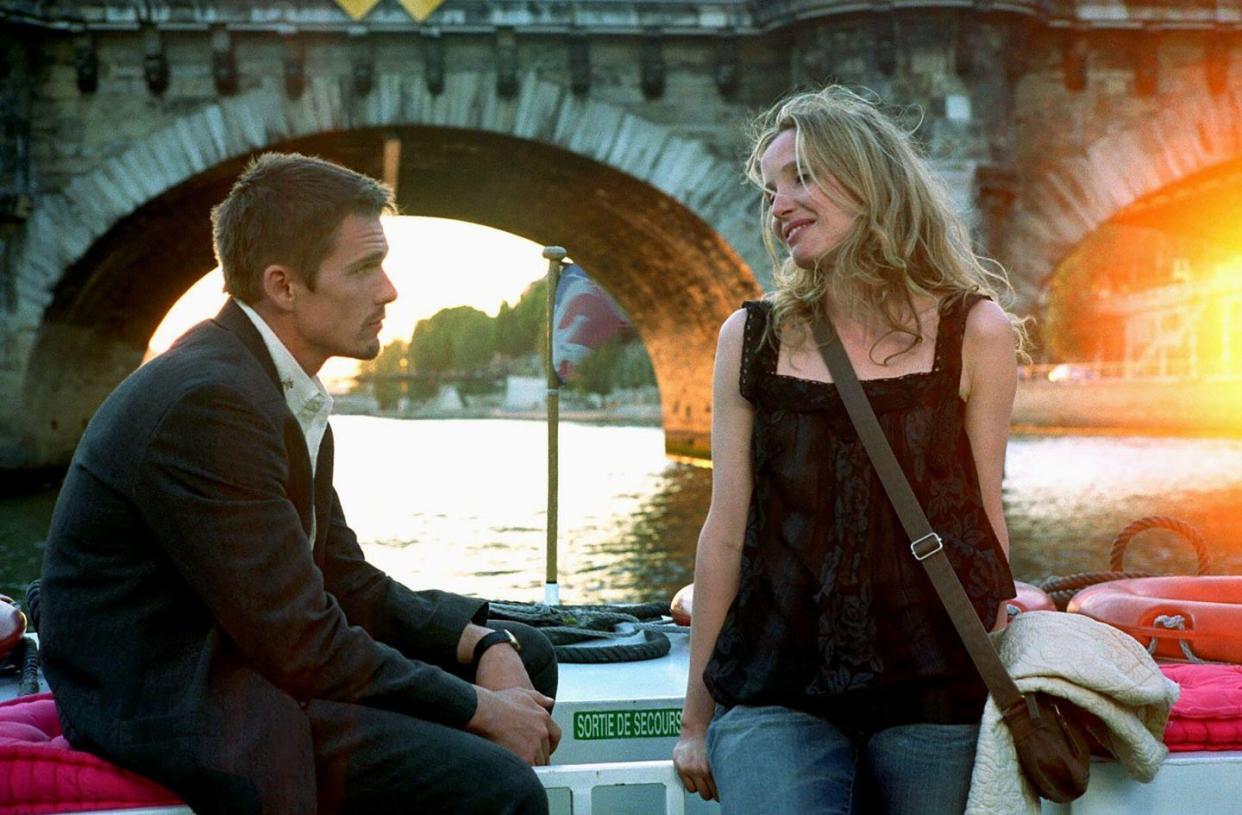
Hawke’s Jesse isn’t quite a hipster, and he’s not a geek. He’s got schlumpy clothes and greasy locks and the kind of facial hair that says, “I can’t commit.” He’s guarded. He has a trace of the masculine impulse to ridicule emotion, and it causes him to ruin two of the loveliest moments he and Celine share—a fortune teller’s reading of her palm, and an achingly beautiful encounter with a scruffy poet who makes up a poem for them based on a word they supply (“milkshake”). But Jesse is also a romantic, appealingly awkward when he wants to kiss Celine for the first time but is too frightened to make a move. And never more so than when, in their final hours together, the two of them wanting to forestall the dawn as much as Juliet believing she’s hearing the nightingale and not the lark, Jesse tells Celine that given the choice of never seeing her again or marrying her, he would marry her.
It’s this boyishness of Jesse’s, charming and a little callow, that will come into play in the next two installments of the trilogy, Before Sunset (2004) and Before Midnight (2013). The first of those two sequels gives us what we’d wished for so hard in the first film—Jesse and Celine together. After not being in contact for nine years, Celine goes to see Jesse reading in Paris from his first novel, a fictionalized account of their night together. By the end of the movie, he has decided to miss his plane home, and thus step out of his unhappy marriage. The movie is an ode to not passing up romantic and erotic opportunities and, fittingly, it leaves the characters right at the apex before they will have to start paying the price for grabbing those chances.
The price becomes clear in Before Midnight, the hardest to watch of the films. Linklater bases much of the movie, a little too obviously for my taste, on the mathematical balance of Eric Rohmer’s comedies of romantic self-deception. But thankfully—and almost unbearably—that serene, distanced approach explodes in the final extended sequence. Jesse and Celine, finally together and with twin girls, their relationship no longer chance encounters that intensify their emotions and hide the lurking difficulties but a day-to-day reality, find themselves letting loose with all the bitterness and disappointment and resentments their union has produced. The movie is almost a negative of Before Sunrise, and it hurts to see what was wonderful about these two characters, the loopy connections that snaked through their endless dialogue, turned into a weapon each wields knowing the other’s most vulnerable points. The movie quite reasonably asks us to accept that the idyll of love is inherently flawed, inevitably broken in upon by the world. But who wants to go to the movies to feel reasonable?
Well before that film, Hawke was betting that he could retain an audience’s empathy while not particularly trying to be liked, wagering that the public could see something good even in a character acting callow or foolish. As Finn, the Americanized version of Charles Dickens’s hero Pip in Alfonso Cuarón's unsung 1998 Great Expectations, Hawke at times seems to be a boy who’s stolen into his father’s clothes and hopes no one calls him on how ill-prepared he looks to be a grown up.
Cuarón shifts the action to the New York art world of the ‘90s where Finn, set up by an unknown patron, finds himself the talk of the town even before he’s had his first show. Finn is dedicated to his art but not above lying to a journalist to make his past seem more romantic, or snubbing the good man who raised him (Chris Cooper) because he doesn’t fit into the hoity toitys at Finn’s opening. What’s remarkable about the performance is that, even when Finn is at his worst—more insensitive than deliberately cruel—Hawke manages to make us feel implicated in Finn’s longing. Who wouldn’t want the world handed to him the way it is handed to Finn? And who wouldn’t want Estella, the girl he has pined for since childhood and played by Gwyneth Paltrow with what can only be called poignant hauteur (or, as the critic Steve Vineberg put it, the sadness of someone with no feelings). The movie is the story of a hungry young man’s transformation into a human being. By the end, Hawke makes the shame Finn carries for the shallowness of feeling in his youthful ambition into something honorable, the price we pay and bear for learning how to be decent to the people we love.
Hawke goes even farther in the 2000 radical reimagining Hamlet. Michael Almereyda’s distillation of Shakespeare’s play—112 minutes, the verse slashed, with some of the most famous (“I have of late, but wherefore I know not lost all my mirth”) delivered via Hamlet’s pixelvision home movies, and an incredible cast, best of all Julia Stiles’s Ophelia—is what Godard might have come up with if he didn’t think the literary sources he pillaged were essentially beneath him. Almereyda looks at New York City and sees a cold, inhuman beauty, skyscrapers rising up along the often dark, windswept avenues as if they were the icebergs and Hawke’s Hamlet were the Titanic. The sheer invention of the movie is elating.
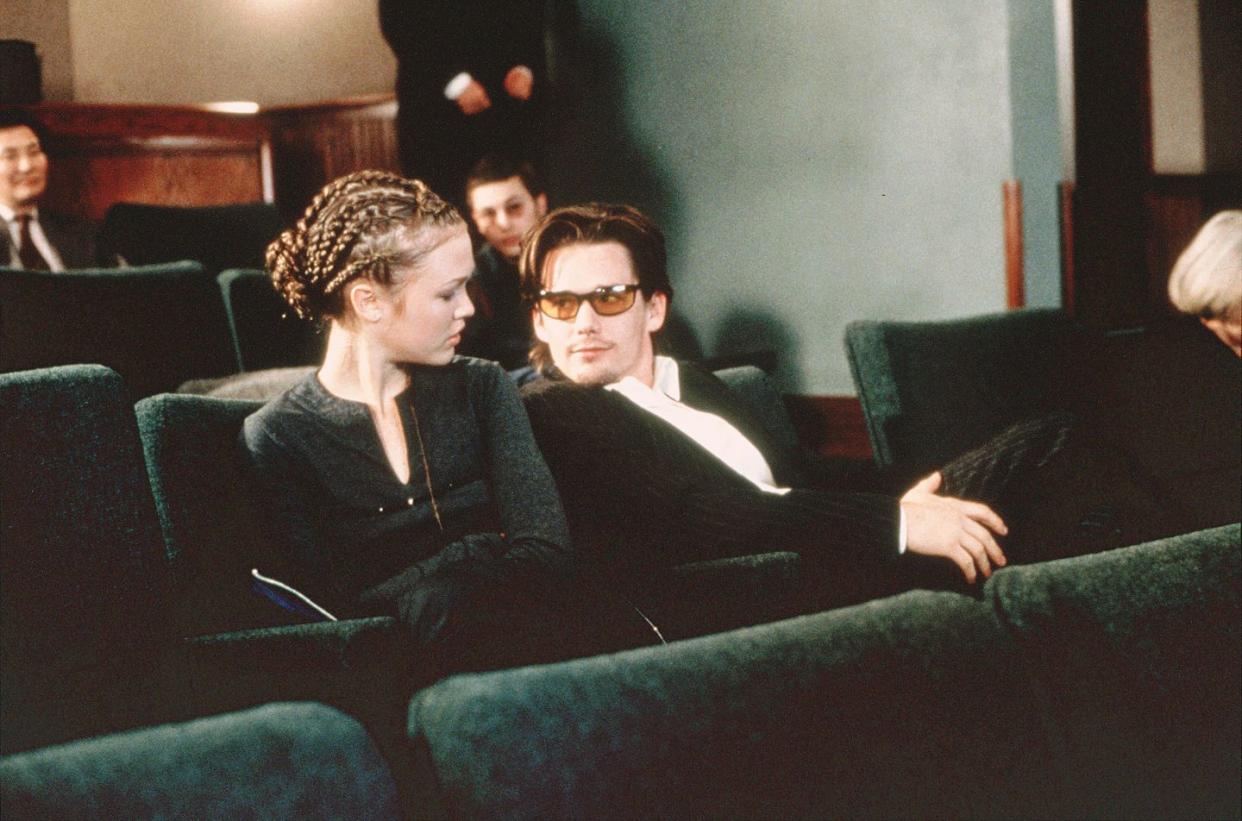
Hawke’s melancholy Dane seems an attempt to graft a version of slacker aimlessness onto the popular notion of the prince as indecisive. (That, for my money, is a thoroughly wrongheaded reading of the play. To want Hamlet to act decisively is to cheer him on to murder. When he does act decisively, killing Polonious when he believes he’s killing the king, he sets in motion the calamities and suicides and murders that follow.) Hawke, wandering through New York in a series of silly knit caps, or slouching around his artfully bookstrewn apartment watching his little video experiments, is both self-indulgent and in real pain and so this Hamlet contains, simultaneously, what is exasperating about the character and what pierces our heart. Along with Kenneth Branagh’s deluxe uncut version, which gives us the beauty of Hamlet’s physical heroism, this is the best, most emotionally accessible screen Hamlet.
Hawke has continued to work, a lot, and often terrifically in pictures like Training Day and Boyhood. Currently, his walk-on in Rian Johnson’s Glass Onion provides one of that movie’s stocking-stuffer surprises. But in the last eight years, he has hit a level of combined depth and daring that some actors reach when they decide what matters to them is the truth, even if it’s a truth that tests an audience’s sympathies. That’s the place Hawke went in First Reformed and even farther as the great junkie jazz trumpeter Chet Baker in Robert Budreau’s Born to Be Blue, and as the wife of the Canadian folk artist Maude Lewis in Aisling Walsh’s Maudie.
There’s no escaping that in the movies actors are haunted by their previous screen incarnations. The smooth open face of the young Ethan Hawke is now an attendant ghost in the lined and creased forehead of the middle-aged Ethan Hawke. At times, the planes of his cheeks seem to be on the verge of hollowing out. In Bruce Weber’s great documentary about Baker, Let’s Get Lost, the images of the beautiful young jazz star, most vividly captured in the photos of William Claxton, haunt the wreck of the aged Baker before us. In Born to Be Blue, a highly fictionalized account of Baker's comeback after a beating in the ‘60s that turned his mouth into a toothless wound, Hawke’s face is almost a death’s head. At times, Hawke’s mouth, no longer dependable as the source of the music he cares about more than anything else, seems to be attempting to retreat into his face. It’s still a smooth face and yet it’s obdurate, closed to anything but what he wants. There’s a sexy and truly unsettling scene where Chet seduces Jane (the brilliant Carmen Ejogo), an actress, later his lover, sidling up closer to her, moving in for a kiss. Ejogo plays the scene with her eyes open, wanting to surrender to this erotic spell Chet is casting and completely aware that this is trouble. You listen to Chet talking to her in the high, light voice Hawke employs in the role, a voice that, on the surface, carries no threat, and you feel nothing but danger.
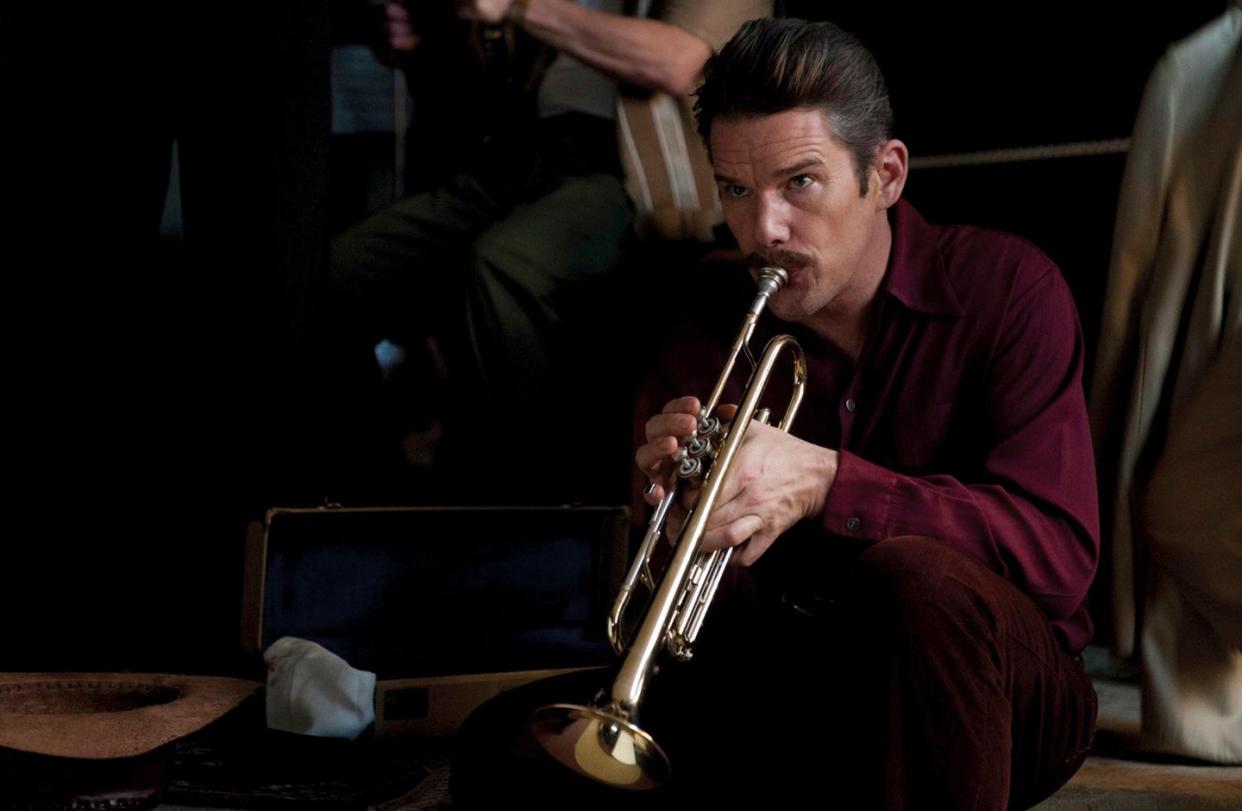
The movie reaches its climax when Chet plays an intimate comeback concert for a small audience of musicians and bookers. He opens with “My Funny Valentine,” maybe the most tender of all American standards. His vocal comes out on a breath, seemingly effortless, even though Hawke’s hunched physical stillness makes you feel the concentration behind it, Chet willing himself not to screw up. Jane is watching and Chet is singing the song to her. And yet the emotion that’s supposed to be there doesn’t seem to make it an inch across the room. In his book But Beautiful, Geoff Dyer described Baker’s singing and playing this way: “Chet put nothing of himself into his music . . . The music he played felt abandoned by him. He played the old ballads and standards with a long series of caresses that led nowhere and subsided into nothing.” And that’s the horror of both this scene and Hawke’s performance, the contrast between what Jane is imagining he means and the almost unimaginably tender affectlessness coming out of this man. It is a pitiless judgment on Baker and a pitiless experience for those of us watching.
In Aisling Walsh’s Maudie (2016), Hawke plays Everett Lewis, a Nova Scotia fish peddler and scrap dealer who advertises for a housekeeper for his small, remote dwelling, and winds up with Sally Hawkins’ Maude, the woman who takes over his life as well as his cabin, becomes renowned for her folk art (Maude Lewis might be best described as the Grandma Moses of Canada), and leaves Everett both adoring this woman and unable to figure out just how it all happened.
It is the story of an unlikely marriage that, because the two people in it are really not suited to the world, becomes its own world. Maude is both guileless and yet able to get exactly what she wants by the subtlest means. And who wouldn’t give in to Sally Hawkins, with her crooked, wholly open smile and shining eyes. If I had to pick a face to give me faith in the goodness of people, it would be hers.
Hawke’s face in the film is completely the opposite. Everett is an inarticulate, rage-clotted man, so tied in knots he has a passing fit of rage when he can’t think of the right word to put in his ad for a housekeeper. Hawke plays almost the entire movie scowling, his mouth pursed together, his brow furrowed, his eyes staring as he struggles to comprehend some part of the world that is not as he expected it—which is every part. When, towards the end, we see Everett in an antiseptic modern hospital where Maude has been admitted, we understand how utterly adrift he is in the world. Hawke expresses all of this with barely a word. The miracle of this performance is that there isn’t a second where he doesn’t manage to convey precisely what this closed-off, bottled-up man is feeling, even when Everett is trying—and failing—to hide his obvious love for this woman whom, though he can’t admit it, has brought color and joy to his life.
You might not relate to what follows at all, but those who’ve experienced something like it know how unsettling it can be. What I’m talking about is watching an actor and feeling that you’re seeing someone you know well portrayed precisely as they are. I had that experience seeing Ray McAnally as the gruff, loving patriarch of My Left Foot. He was the soul of my Canadian grandfather, an angry, deeply emotional man, who could lash out at his children or his wife, and reliably break into tears at midnight each New Year’s Eve, or while watching the funeral of the assassinated president he didn’t vote for. (I took my father to see the movie and when McAnally came on screen, I said to him, “Who’s that?” Immediately recognizing his father-in-law, he said, “That’s your grandfather.”) My grandfather came from the outports of Newfoundland, where Maudie was filmed. Hawke’s performance made me feel I was seeing him again, but this time in the harsh world that shaped him as a young man seeing the mottled anger, the frustration, and his helpless love for a woman he frequently didn’t treat well.
That is a very personal response, and I can’t expect anyone to share it. But in a career whose work has steadily deepened, has consistently found the true note, even if that note isn’t the prettiest, Ethan Hawke continues to offer unexpected gifts. I’m confident you’ll find yours.
You Might Also Like
